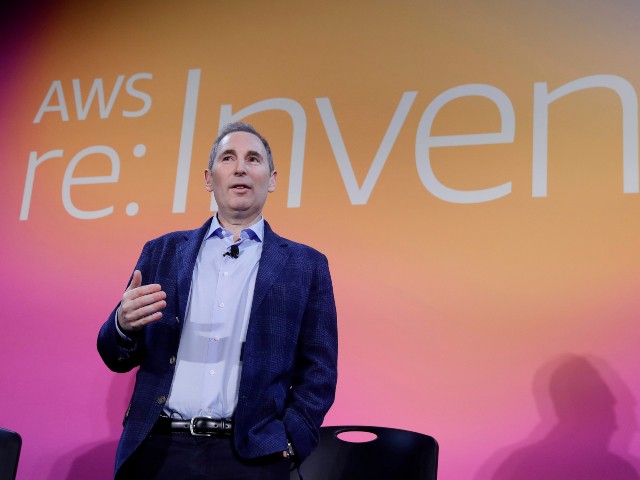Corporate employees at Amazon will reportedly receive compensation that falls far short of expectations due to Amazon’s declining stock price. Amazon’s 35 percent drop in share price will result in corporate employees receiving total compensation worth 15 percent to 50 percent less than their target values.
The Wall Street Journal reports that Amazon’s stock decline over the past year is causing employee pay to come in significantly lower than target compensation, according to people familiar with the matter. Restricted stock units, which make up a significant portion of the total compensation paid by Amazon to its corporate employees, are causing pay for 2023 to be between 15 percent and 50 percent lower than the projected targets the company gave employees, according to some of the sources.

A pedestrian walks near the Amazon Spheres on the company’s corporate campus in downtown Seattle, Tuesday, Dec. 7, 2021. (AP Photo/Ted S. Warren)
Amazon has lost more than 35 percent of its share price over the past 12 months. Amazon reportedly bases the issuance of restricted stock units to employees on the belief that Amazon’s shares will increase in value by at least 15 percent annually.
By linking total compensation to the business’s long-term performance, Amazon’s compensation model aims to inspire employees to think like owners. The model carries some risk and potential upside from year to year due to the stock price’s volatility. However, historically at Amazon, it has performed extremely well for employees who have taken a long-term perspective, according to an Amazon spokesman.
Historically, Amazon has paid base pay to employees at a lower rate than its big-tech competitors, but it has made up the difference with stock awards that vest over time. According to this strategy, the longer an Amazon employee works for the company, the more their compensation may be based on stock awards, with some stock awards accounting for 50 percent or more of their total income.
According to training documents examined by the Wall Street Journal, the company’s human resources department recently sent information to managers on how to effectively communicate a pay cut to its employees. The materials advise managers to hold on to the restricted stock longer until the company’s stock price recovers and concentrate on getting workers invested in the business’s long-term success.
Amazon CEO Andy Jassy addressed the issue at a recent all-hands meeting at Amazon’s Seattle headquarters. “I know that this is and feels like a really difficult time. We have a very uncertain economy, we just had to say goodbye to 18,000 of our teammates, the market is in a funky spot,” he said, adding that Amazon and other companies have seen an impact on their stock prices. “The result is compensations are impacted. And that is challenging. All of that is difficult. But I am quite optimistic that we have the chance to emerge from this challenging time in a relatively stronger position than we entered it.”
The biggest round of layoffs the business has ever implemented started in November as Amazon adjusted to declining retail demand in addition to years of massive hiring. The company laid off 18,000 corporate employees by the end of January, more than any other technology company during this recent round of layoffs.
The layoffs are a part of Amazon’s strategy to reduce expenses. The company also postponed the start date for some new hires by six months and revoked job offers to some applicants who had accepted them but hadn’t yet begun.
Lucas Nolan is a reporter for Breitbart News covering issues of free speech and online censorship. Follow him on Twitter @LucasNolan


COMMENTS
Please let us know if you're having issues with commenting.